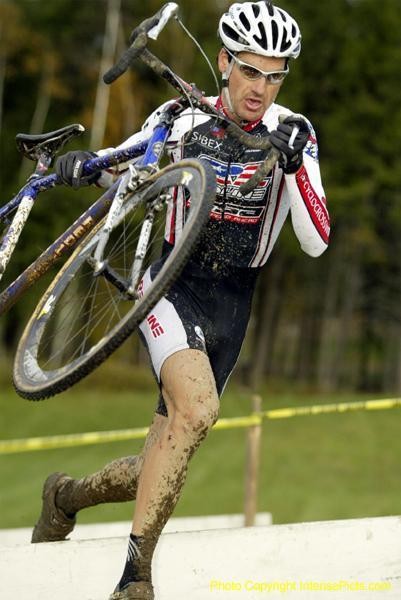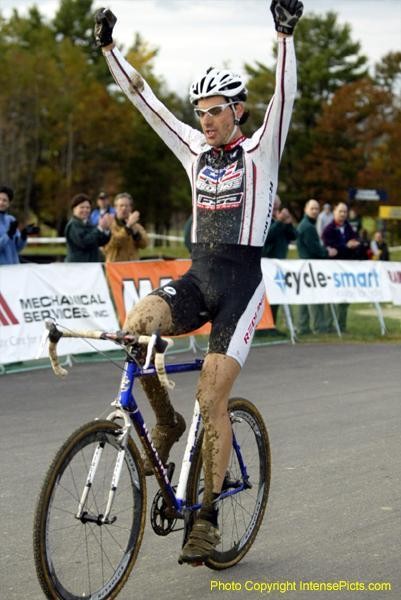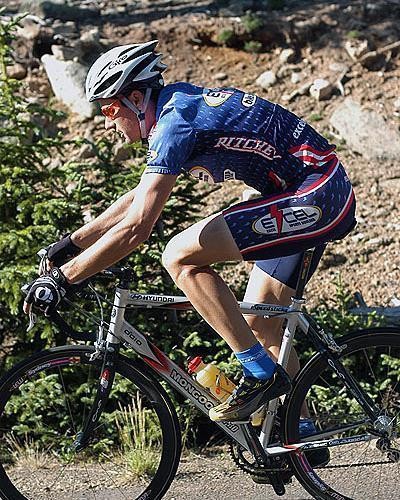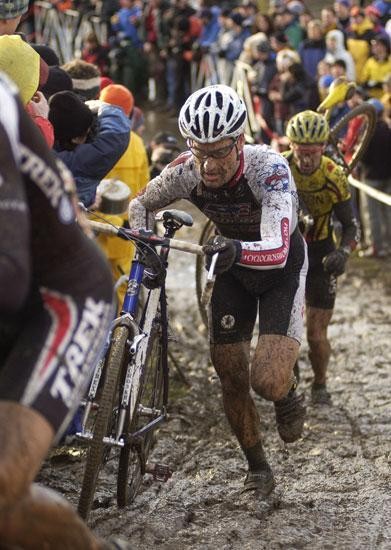For the love of 'cross and all things new
With his 15-year career ending at the U.S. cyclo-cross nationals this year, Steve Medcroft wanted to...




An interview with Marc Gullickson, November 11, 2004
With his 15-year career ending at the U.S. cyclo-cross nationals this year, Steve Medcroft wanted to catch up with Marc "Gully" Gullickson, to get a perspective on the sport from the cyclist who has seen it all and learn where a life in cycling will take him in the future.
U.S. cyclo-cross is experiencing a renaissance. The formerly fringe sport is becoming a mainstream part of our cycling culture. The top of the field is growing thick with talent. Crossover racers from mountain biking and road racing are challenging the elite core of perennial cyclo-crossers. Bike manufacturers are spending money on sponsorship and promotion at higher levels than since the heyday of Supercup racing in the late nineties. The old venues are maturing, new venues are being introduced, and race promoters are finding ways to work together to build the opportunities for racers and sponsors alike.
The fact that so many people are falling in love with cyclo-cross in America is no surprise to long-time 'crosser Marc "Gully" Gullickson. Racing 'cross for more than a decade, Gullickson has earned every major accomplishment in the domestic version of the sport and has been around to see the ebb and flow of 'cross's popularity.
Cyclingnews: We should start by digging through your background a little. You're a veteran. We've seen you on results lists for a long time. How did you get involved in cycling?
Marc Gullickson: I was originally interested in Nordic and cross-country skiing. Throughout high school and for two years in college, it was the sport I excelled in and wanted to keep doing. But at some point during college I was introduced to cycling through my older brother Noah. I started to race on the road to keep my fitness for cross-country skiing and managed to do quite well. It was good for me. I could stay healthier in the summer and even though skiing was my passion, I liked the newness of cycling. I ended up spending a lot of time racing on the road and ultimately wound up in Europe in 1991 for a summer with Marty Jemison (who ended up on the U.S. Postal team).
CN: Did racing in Europe make you a better cyclist?
Get The Leadout Newsletter
The latest race content, interviews, features, reviews and expert buying guides, direct to your inbox!
MG: We raced as amateurs in the south of France. It was a great experience but was so physically demanding it left me feeling like I didn't really have the stuff to turn pro like I wanted. I was physically and mentally depleted. Being away from home was hard, away from my comfort zone, family and friends. The racing was a lot harder than at home too. Don't get me wrong, I gained a lot physically. I feel like my abilities rose a couple of levels but by the end of the summer I was just kind of ready to have another life, a normal life.
CN: Did you achieve that 'normal' life?
MG: I moved to Colorado for cross-country skiing - it was the top place for it. Cycling came back into my life pretty quickly. My younger brother was really into mountain biking so I dabbled in that the spring after skiing season. With nothing else to do, I ended up riding for Iron Horse bikes as an Expert and did quite well that first year. I turned pro at the end of the year. It just evolved from there. I raced for Iron Horse for three years, Mobile Canada for two, GT for three. I raced for Marin bikes for a year then four years for Mongoose.
CN: You owe a cycling career to your brothers. Are they still active?
MG: They ride. They don't race.
CN: When did you pick up cyclo-cross?
MG: On team GT in the mid-to-late nineties. I wasn't doing that well with GT at first. I slumped my first year and decided that I needed to stay in better shape through winter. They gave me a couple of 'cross bikes and sent me up to the national championships. It was this new thing to me and I loved that about it. It seemed like a fresh start from mountain biking. Even though I continued to mountain bike for a few years after that, it was exciting to have a new discipline, a new technique, a new style of riding, new scenes, new venues and a bunch of new people to get to know.
CN: How is cyclo-cross in the U.S. different now than it was just those few years ago?
MG: For me, one big difference is the group of top guys, the guys I focus on when I'm racing. There's a whole new crop of characters and the competitive level has risen quite a bit. We see deeper fields, more good racers, and more racers from all across the country - not just the hot beds of the Northeast and Northwest but places like California and Colorado. There's more awareness of the sport now as well. 'Cross is much better respected now.
CN: Was it not respected as a sport early on?
MG: I think it was a little more fringe back then. It was considered cultish -- although a lot of people would like that to still be the case - and it still is to some degree. In the cycling world now, 'cross is much more accepted as part of the mainstream. Which I think it's good. There's more opportunity in the sport, more recognition. It's a good sport. The more people that do it, the better it gets.
CN: As a racer, is your sponsorship completely different for cyclo-cross than it is for your regular cycling season. Meaning, do you have to go out and line up a completely different season of sponsorship in order to race cyclo-cross?
MG: Although this year is a bad example because I didn't race in the summer at all, I have always found the sponsorship to carry over from the regular season. I've always raced for a professional mountain bike team in spring and summer then rode cyclo-cross for the same team with the same sponsors in fall and winter. However, for the last two years I've raced for Redline in the 'cross season and on the road during the regular season for a local team - Excel Sports road team. So it can go both ways for a racer.
CN: What do you do during the summer now?
MG: Be unemployed right now. But not for long. I've run into a job with Hutchinson tires and I'll be marketing for them within the bike industry. It's the perfect job for me because I have a lot of contacts in the industry and I get to stay around bike racing - which is what I love to do.
CN: Take me though your career from a cyclo-cross perspective. How did it evolve?
MG: With that first start with GT, I raced around Colorado followed by a trip to Seattle for a couple of Supercups then the nationals were the week after that. I finished somewhere in the top 10, maybe 10th. The next year, I went to a number of the Supercup races then nationals again. In 1999, I raced for a conglomerate team sponsored by Vodoo and Boulder Denver Couriers. That year, I went to all the Supercups. I won nationals and followed it by winning the Supercup finals the next day.
CN: You have world championship experience as well.
MG: Yes. I started to go to the world championships as part of the U.S. National team very early in my 'cross career, 1998 in Denmark for the first time. That was a real eye-opening experience. Racing against the top European 'crossers was a dream come true. Everything was so new. Although I'd raced in Europe on the mountain bike a number of times, it was cool to go do a big 'cross race. I think I got 28th or something but it was the best U.S. placing at the world championships to date - a fact that was hugely motivating to me and a factor in helping me win nationals the next year. I went to worlds five times in a row after that.
CN: Once you had success in 'cross, was mountain biking shifted to second place in your life?
MG: Not too much. It was more complement than competition between the two. I'd always struggled in August anyway, posting better results in the spring and summer mountain-bike season, so I would refocus for the 'cross in August and it usually would work out well. I'd take a short break at the end of the mountain bike season then ramp up quickly for 'cross.
CN: What does it take for a cyclist to have a successful elite-level regular season and still be competitive for cyclo-cross?
MG: I wonder that too. I wonder how guys like Todd Wells and Kabush race so hard through the mountain-bike season then come to 'cross fresh and motivated. For me, it was always that 'cross was such a different kind of racing. It really feels like a totally different sport. The change in venues makes it feel new. I like the atmosphere at a 'cross race; the spectators are really knowledgeable and enthusiastic. With the style of racing - on short circuits - and the crowds, it's fun to be out in the lead. I like the fact that, with a good 'cross course, even though it's painful and will be a challenging hour, there's too much going on to feel it. Between the tactics, the dynamics of the race and the challenge of the course, you can almost forget about the pain. It's not the same in mountain biking when you're out in the middle of some course going up a hill as hard as you can with no one else around for ten minutes. 'Cross is more intense, more exciting, more fun.
CN: Technically different from both mountain bike and road racing, do you think one type of cyclist makes a better cyclo-cross racer?
MG: I used to think that road riders had an advantage because of the tactics and how some of the efforts parallel road racing but so many mountain bikers are doing so well at it. I'm not so sure any more. I don't know if mountain bikers do well because it's a more appropriate crossover and a better match for their mix of fitness and technical skill. Who knows? Maybe it's none of that. Maybe it's just that whoever loves it the most does the best at it and right now there's a bunch of mountain bikers who love it.
CN: You've been to world's five times. Won nationals once. What are your ambitions for this year?
MG: I haven't really told anyone in the press yet but this year's nationals are going to be the final race of my career. Portland will be my last race. I've been transitioning to make another life for myself in cycling through coaching.
CN: Then transitioning into the industry?
MG: The job with Hutchinson is exciting but there are other possibilities within USA Cycling I might be suited to as well - mountain bike development and involvement in national team coaching. Those opportunities, should they come, are exciting to me. I really love going to the big races and I think I have a lot of experience that would be valuable to juniors and U-23 guys. I hope to be the national coach for the junior world's team.
CN: When did you first start coaching?
MG: I've always enjoyed working with athletes who are super-committed, who are at the top level in their sport. I feel that I have a lot of valuable knowledge for those kids and that working with them is a way to give back and stay involved in racing. Now I'm towards the end of my career, I feel I can give the right kind of time and attention to people that I would be coaching. When I was racing, it was such a demanding sport, a sport where I felt that if I did any coaching, I wouldn't be able to give them all the time and effort they needed.
CN: Will you stop racing altogether?
MG: Not altogether but for the first year I'll probably put the brakes on pretty heavily. I like to race but I don't think I need to start doing the master's races across the country. Never say never though.
Other Talking Cycling Interviews